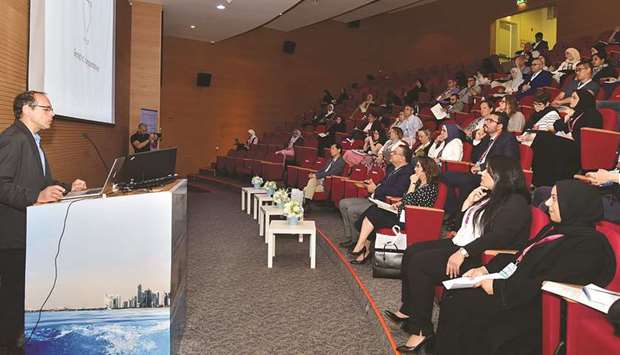Qatar University’s (QU) Biomedical Research Centre (BRC) recently concluded a five-day conference and workshop, titled ‘Current and Emerging Trends in Zebrafish Research’, which involved both theoretical lectures by renowned experts in the field and hands-on practical sessions to train interested researchers.
The conference was organised in co-operation with Sedeer Medical, Primary Health Care Corporation, Qatar National Research Fund and Al-Obeidly Trading Technology.
The conference featured more than 100 attendees, including speakers from places outside Qatar, such Turkey, Japan, the US, the UK, Germany, Singapore and Spain, in addition to speakers from various sectors in Qatar.
The aim of the programme held at QU was to focus on the utilisation of the zebrafish model in a variety of research investigations, and to introduce this relatively new animal model to students, academicians, researchers and healthcare practitioners in the nation, the university said in a statement.
The workshop also provided a platform for establishing new collaborations.
Prof Mariam al-Maadeed, QU vice-president for Research and Graduate Studies, said, “Zebrafish is a small, beautiful and unique creature, which has a number of exceptional attributes, making it a vital topic in medical scientific research. The genes of the zebrafish are similar to human genes and have a unique ability to regenerate damaged cells and
tissues.”
Zebrafish hosts a slew of advantages, which make it an important scientific tool. Such advantages include low experimental cost, transparent embryos, external development and a high fecundity, making them suitable for large-scale genetic screening, the
statement explains.
Being a vertebrate model, zebrafish have been shown to exhibit physiological responses that are similar to humans, such as after exposure to medicinal drugs, including hormones, cancer drugs and environment pollutants, including pesticides and heavy metals.
Prof al-Maadeed added, “Research on zebrafish has provided us with impressive results and opened an advanced route in biomedical sciences, which has led researchers to a rare opportunity to diagnose and treat many human diseases, foremost among them cardiovascular and other diseases. Heart disease is still a serious threat to human life everywhere, and it is a major cause of death of millions in the world, including the Gulf and Qatar.”
In 2014, QU set up a zebrafish facility at the BRC, which is currently managed by Dr Huseyin Cagatay Yalcin, Dr Fatiha M Benslimane and Dr Gheyath Nasrallah, who have been working in the zebrafish facility since its establishment. They run what is considered a multidisciplinary service lab that supports researchers from inside and outside QU to conduct their experimental works.
In this laboratory, they have exploited the zebrafish embryo model to investigate the toxicity of some novel chemical compounds and nanoparticles that potentially have
bioapplications.

A session of the conference.
